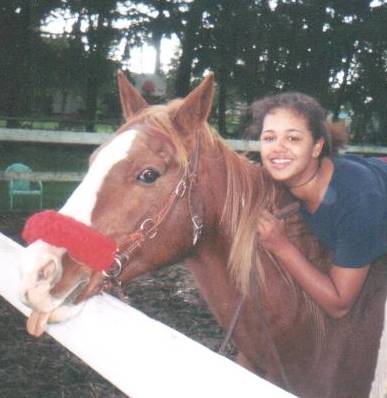Horses Are Just Big Noses
I've thought it to myself plenty of times, but today when my mother came over and was in the barn greeting the newest batch of kittens, it was expressed out loud. Horses are just big noses.
Wherever you are standing that's within a neck length, you'll have a horse nose there. On your shoulder, nudging you in the back, breathing hot air on you, nibbling your hair or whatever you have in your hands, sniffing your clothes, and just being generally in your business. In my experience, the younger they are the worse it is but many of the older horses are awfully nosey too.
I don't think they're looking for food, although they do get occasional treats so they may be hoping to get lucky. They absolutely love to be scratched and petted and I know I've found myself absently rubbing a guy who had nosed his way in to what I'm doing. I have also observed how they appreciate burying their noses in the cat's fur and sniffing it in, which is not something the cats usually stand for unless I'm holding them. The horses also enjoy "helping" me clean the stalls by way of mouthing the end of the muck rake as I'm trying to use it and standing as close on top of me as I'm bent over as to be almost piggy-back. They like to think of themselves as lap-dogs.
I know that this can be considered obnoxious behavior and I should put a stop to it. But I appreciate that the little (and not so little) pests are friendly and personable, curious and mild- mannered. I like the fact that I can have friends and family over to pet the heads hanging eagerly over the fence. Whereas some other horses I've known would rather move away from outstretched hands or stand glowering in a corner, ignoring any onlookers.
Manners are in the eye of the beholder, I believe, and I think my horses have good manners. There are lots of worse habits a horse can pick up than becoming a big nosey nose.
Wherever you are standing that's within a neck length, you'll have a horse nose there. On your shoulder, nudging you in the back, breathing hot air on you, nibbling your hair or whatever you have in your hands, sniffing your clothes, and just being generally in your business. In my experience, the younger they are the worse it is but many of the older horses are awfully nosey too.
I don't think they're looking for food, although they do get occasional treats so they may be hoping to get lucky. They absolutely love to be scratched and petted and I know I've found myself absently rubbing a guy who had nosed his way in to what I'm doing. I have also observed how they appreciate burying their noses in the cat's fur and sniffing it in, which is not something the cats usually stand for unless I'm holding them. The horses also enjoy "helping" me clean the stalls by way of mouthing the end of the muck rake as I'm trying to use it and standing as close on top of me as I'm bent over as to be almost piggy-back. They like to think of themselves as lap-dogs.
I know that this can be considered obnoxious behavior and I should put a stop to it. But I appreciate that the little (and not so little) pests are friendly and personable, curious and mild- mannered. I like the fact that I can have friends and family over to pet the heads hanging eagerly over the fence. Whereas some other horses I've known would rather move away from outstretched hands or stand glowering in a corner, ignoring any onlookers.
Manners are in the eye of the beholder, I believe, and I think my horses have good manners. There are lots of worse habits a horse can pick up than becoming a big nosey nose.

